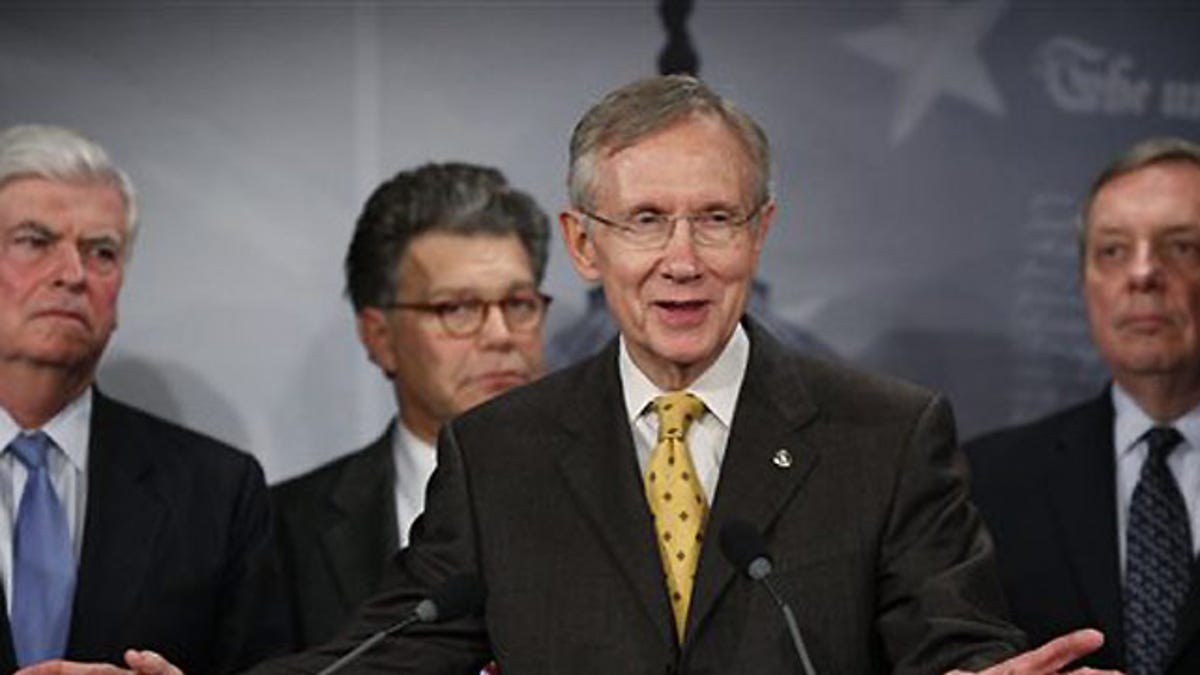
AP
In the fantasy-world that is Washington, D.C., Senate Majority Leader Harry Reid will claim today that his proposed health care legislation will actually save the country money. He'll do this with the imprimatur of Congressional Budget Office and despite the fact that his legislation creates a vast new middle-class health care entitlement that will add 15 million people to the Medicaid rolls and create a bureaucratic army to micromanage every decision made by every doctor in the United States. Reid will no doubt make his claim with a straight face and even tout the supposed deficit reduction as a benefit of the bill. Don't be fooled. It’s a farce. This bill is an enormous budget-buster and it's coming at a time when the American economy is still reeling.
Here are the three biggest gimmicks in the proposed Senate bill:
1.The Reid bill still starts hiking taxes and cutting Medicare immediately, while the new spending programs are delayed until January 2014. That’s 6 months later than the last version of the bill, which seems like a strange way to go about addressing what we’re told is the most urgent crisis the country faces. Costs escalate dramatically in the later years, with spending of $196 billion in just 2019 alone. Without this gimmick, the fully phased in 10-year cost would be not the much-touted $848 billion is about $2.5 trillion.
2.The so-called “doctors fix” provision of repealing the so-called Sustainable Growth Rate mechanism of limiting Medicare payments to doctors is only included for 2010. So the Reid bill pretends Medicare payments to doctors will be cut by 23 percent in 2011 and stay at that low-level. That’s totally dishonest, because it would drive most doctors out of Medicare. That raises the real price-tag of the bill another $247 billion.
3.The bill includes yet another new entitlement program, a long-term care insurance program called the CLASS Act. This new federal entitlement program will supposedly reduced the deficit. That’s because the CBO counts the programs 10-year revenues of $72 billion as deficit reduction to help pay for the Reid bill, even though it will cost far more than it raises once benefits start being collected in the future. This is another new entitlement time-bomb, when Social Security and Medicare already have staggering multi-trillion dollar unfunded liabilities. But the Democrats and their supporters claim it reduces the deficit.
Aside from these gimmicks, the general Washington political culture and the CBO in particular, are notoriously inept at forecasting the deficit impact of health care bills. As Cato Institute economist Dan Mitchell demonstrates in his excellent new paper and explains in this video, the tax revenues are likely to be much lower than projected and the spending is likely to be much, much higher -- making the Senate bill a sure-fire budget buster.
Most of the American people know that this health care bill will be enormously expensive -- no matter what politicians and budget officials in Washington claim. China knows it too, recently telling President Obama it would prefer not to finance yet another massive U.S. government new spending program. But with the staggering multi-trillion dollar debts we already have, many of us simply feel numb to big numbers. These days it feels like the repeated use of the word "trillion" amounts to just so much Monopoly money. And such a feeling might not be so far-fetched because our unsustainable borrowing is already depressing the value of the dollar. It's also quite possible that galloping inflation could be on the horizon -- possibly even without the additional trillions of reckless spending in the health care bill.
So what about the non-fiscal costs? What does this bill mean for patients and doctors? It means, fundamentally, a loss of control over our own health care. The bill is riddled with vast new bureaucracies and enormous new grants of power to federal officials. Doctors will be supervised for compliance with “performance measures.” Central planners will designate which areas of the country doctors should practice in, and penalize them if they practice elsewhere. All of our medical information will be transmitted to the government, so that physicians can make their treatment recommendations.
Perhaps most amazing of all, this bill -- which uproots hundreds of millions of Americans from insurance plans and doctors that they like and subjects them to unprecedented government control -- does little to solve the problem of the uninsured. At the end of the first 10 years, the CBO says there would still be 24 million uninsured in the United States. And about 15 million more people would be on Medicaid, a welfare program whose costs fall partially on the states. The CBO also estimates 5 million people would lose the employer-based coverage they have now. Everyone will be subject to new regulations, restrictions and requirements that mean they won’t really be keeping the coverage they have now.
If that’s not insane enough, think about this: we are in an economic crisis. Unemployment stands at 10.2 percent, and it’s at 17.5 percent if you include people who have given up looking for a job and those working part-time who wish they weren’t. One of the only bright spots in our struggling economy is health care, which created 597,000 new jobs since the recession began. It’s almost like Washington, which already owns stock in so many dogs like the financials and the autos, wants to diversify its portfolio by taking over health care. We can’t let them.
Mr. Kerpen is director of policy for Americans for Prosperity. He can be contacted through Phil Kerpen.com. Follow him on Twitter and Facebook. His free two-minute Podcast is available daily.
